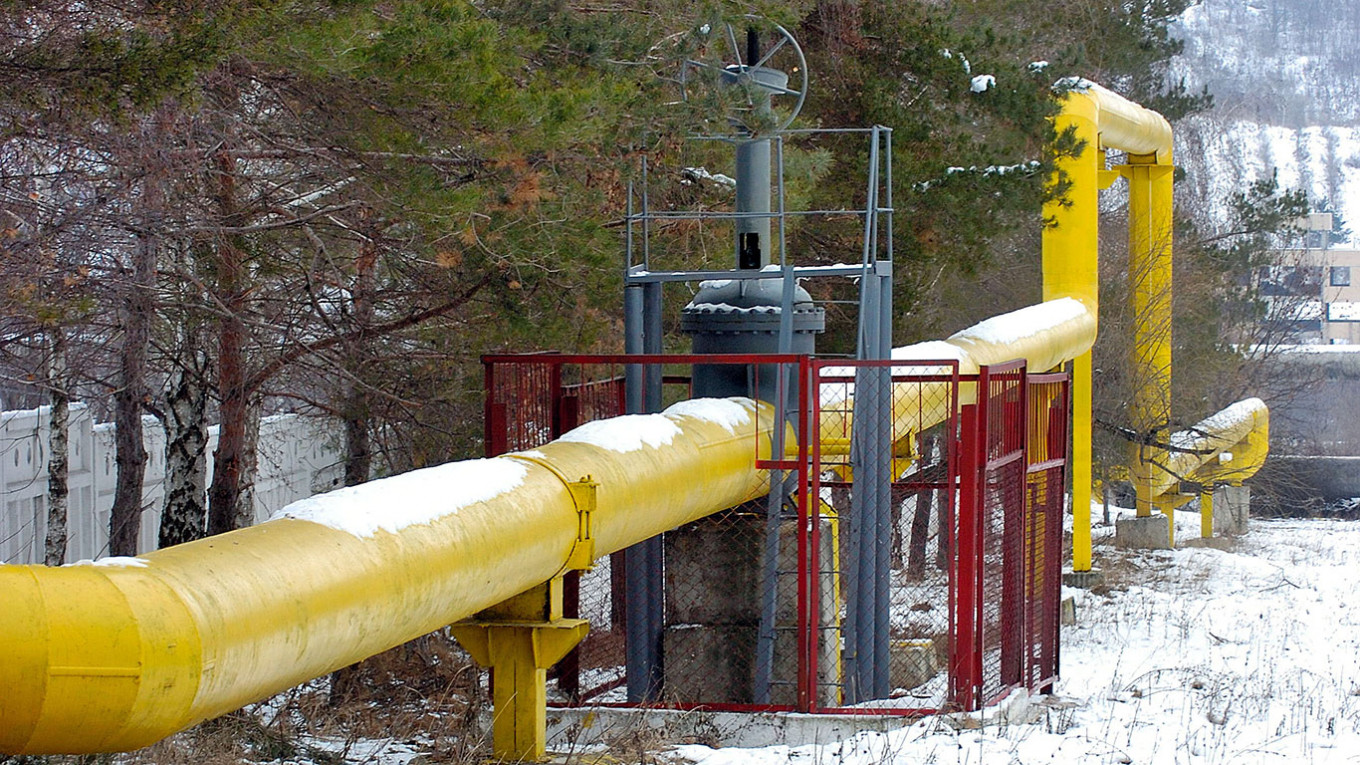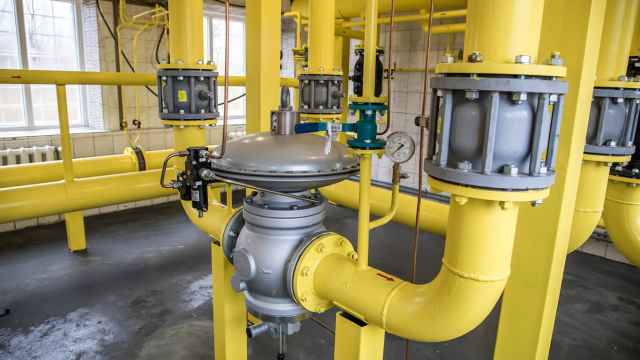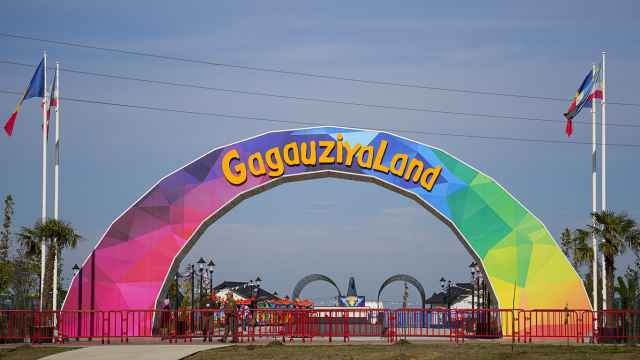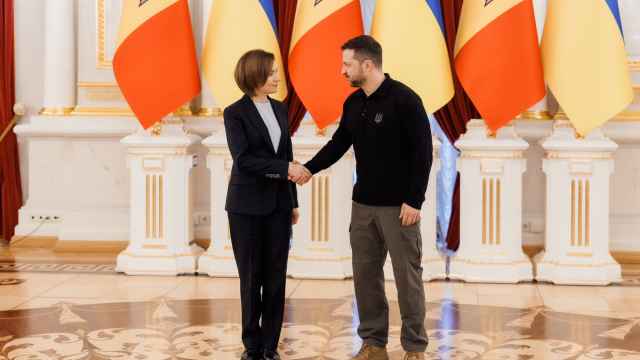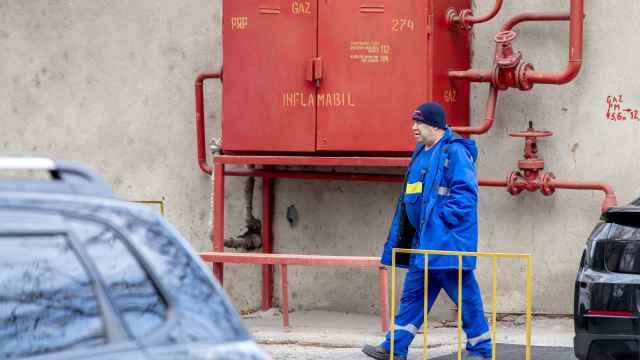Moldova’s recent gas crisis, which left supplies in jeopardy for several weeks ahead of the winter until a new contract was agreed with Russia’s Gazprom to replace an expiring one, came as a surprise for many observers. Yet several unresolved issues had marred the Moldova-Russia gas relationship, notably accumulated debt, which played a major role in the crisis.
Moldova’s gas consumption is very small at about 2.9 billion cubic meters (bcm), of which right-bank Moldova consumes about 1.3 bcm, while the breakaway republic of Transnistria consumes the rest. Moldova has no gas production of its own, and its national gas company, Moldovagaz, imports 100 percent of the country’s requirements from Gazprom. Moldovagaz owns the gas transmission network, as well as local supply and distribution companies. Gazprom owns 50 percent of Moldovagaz, with the remaining shares split between the Moldovan central government (36.6 percent) and the administration of the Transnistrian region (13.4 percent).
Although Moldova is de facto a partitioned country (the Moldovan central government has no control over Transnistria), Moldovagaz is de jure a unified gas company, and all supply and transit contracts are concluded between Gazprom and Moldovagaz. It is understood that supply contracts stipulate volumes to be delivered to right-bank Moldova and Transnistria separately, with payments also made separately.
Debt accumulation has been a constant feature of Russian-Moldovan gas trade throughout the post-Soviet period, with both right-bank Moldova and Transnistria running high debts, although the former’s debt has been significantly lower — and the payment discipline significantly higher — than the latter’s. By October 2021, Moldova’s gas debt stood at about $709 million (principal debt is about $433 million) for right-bank Moldova and about $7 billion for Transnistria.
Genesis of the Crisis
Prior to the end of September 2021, Gazprom supplied gas to Moldova under a 2006 five-year contract that had been extended on an annual basis. That contract, whose price formula was originally based on oil price indexation, was set to expire on September 30, 2021. Under the contract, the average annual price in 2020 was about $148 per thousand cubic meters (mcm). The second half of 2020 saw exceptionally low European gas hub prices, with the Dutch TTF hub price falling to about $75/mcm.
The prevailing expectation was that low prices would continue into 2021, thus giving Moldova every incentive to seek some degree of hub price indexation. The Moldovan government apparently sought to negotiate a new contract that would give it more beneficial terms. Although no new contract was signed, the old contract was amended in January 2021 to introduce the German NCG month-ahead hub indexation for the warmer months — the second and third quarters of 2021— while preserving oil price indexation for the first and fourth quarters.
Contrary to expectations, European hub prices did not remain at the low level, but started to increase in late 2020, having reached about $300/mcm by January 2021, before falling briefly to about $200/mcm by March 2021, and then increasing sharply and seemingly inexorably to about $900/mcm in September 2021, with a particularly steep rise occurring from August onwards. As some of that increase fed through the contract, the price for Moldova in September 2021 increased to $550/mcm. Suddenly oil price indexation started to look far more beneficial than hub indexation.
Meanwhile, witnessing the European gas hubs’ price rally, Moldova never publicly said it wanted to extend the old contract, which would have ensured supplies at lower than hub prices, as its provisions stipulated oil-indexed prices for the fourth and first quarters. Rather, it continued to seek a new gas contract with Gazprom, although reportedly made no serious effort to negotiate it prior to the old contract nearing expiry. The new contract was one of the key issues discussed during the meeting in Chisinau on August 11 between Moldovan President Maia Sandu and Russia’s presidential envoy Dmitry Kozak. Kozak talked positively about the prospects for the new contract, saying that a “mutually beneficial” solution was needed.
The Collapse of the Talks
With the old contract about to expire, no new contract was yet in sight. Gazprom reportedly offered a hub-indexed price (about $790/mcm) with a 25 percent discount, which was conditional on debt repayment over a period of time, whereas Moldova had asked for a 50 percent discount. The price, although high, was reflective of the European gas market. As the parties failed to agree, Moldova asked Gazprom to extend the old contract for October. This request was made on the expiry date of the old contract: September 30. The contract was extended on the same conditions as in September (hub-indexed), resulting in a price of $790/mcm for October. It was not until the old contract expired—and it became clear that talks on a new contract had failed —that Moldova publicly said it wanted to extend the old contract on its previous terms.
As Moldova only asked to extend the contract on September 30, Gazprom was unable to book corresponding capacity at an auction held on September 20 in accordance with the EU Capacity Allocation Mechanism (CAM) Network Code, as a result of which Moldova contracted only 54 million cubic meters (mmcm) for its right-bank consumption — the amount for which Gazprom had sufficient capacity under previous bookings — compared with the region’s 80 mmcm monthly consumption for October. As the ensuing shortage led to linepack gas in the Moldovan gas transmission system starting to be used, Moldova introduced a state of emergency on October 22 through November 20 to procure alternative supplies for balancing the grid. For several days, Moldova bought or borrowed additional gas — about 5 mmcm — from other suppliers (such as PGNiG, ERU, Vitol, and DXT) to complement its gas balance and prevent pressure from decreasing to critical levels. That gas was extremely expensive (supplies from PGNiG were about $1100/mcm at the TTF day-ahead rate), but no gas was available at lower prices. Since hubs are the prevalent price formation mechanism in Europe, no European supplier would sell gas to Moldova at a lower price. These purchases made it abundantly clear to Moldova that the only affordable way out of the imminent gas crisis was to secure a contract with Gazprom at a price lower than the hub-based price.
Reasons for Failure
It is unclear why the talks on the new contract collapsed. Russian President Vladimir Putin was one of the first world leaders to congratulate Sandu on her convincing victory in Moldova’s presidential elections in December 2020, and his envoy Kozak was the first high-ranking official to visit Moldova after its pro-European government took office in August 2021. As noted above, the Sandu-Kozak meeting sounded very positive. Russia stood to win nothing from a gas standoff with Moldova, either commercially or in PR terms, as it was certain to result in yet more accusations of using gas as a weapon.
It seems much more likely that Moldova wanted (and may have been encouraged) to conclude only a short-term contract with Gazprom and not to accept its conditions—including on debt repayment and how to implement the EU acquis with regard to (Gazprom co-owned) Moldovagaz—while hoping there would be a safety net provided should the negotiations fail. No such safety net materialized.
As the crisis was unfolding, the EU provided Moldova with financial assistance worth 60 million euros (the equivalent of about two-thirds of Moldova’s monthly consumption at current hub prices) “to set up a support scheme for the most vulnerable people,” but otherwise remained largely on the sidelines. Moldovan Prime Minister Natalia Gavrilita asked the EU for help, saying that without a contract with Gazprom, Moldova would need to spend about 800 million euros over the next five months on alternative imports at market prices to meet its winter demand. The EU High Representative for Foreign Policy Josep Borrell said on October 28 that the solution to the crisis would “not come from the European Union funding all the differences between the current prices and the prices that Gazprom is asking for.” The EU’s message could hardly have been clearer, and Moldova signed its contract with Gazprom on the following day, October 29.
Resolution and a Way Forward
On October 29, Gazprom and Moldovagaz signed a five-year contract, and supply began on November 1. The contract is understood to be an extension of the old one, with some adjustments. Although the formula has not been published, it reportedly takes into account the price of oil and gas in the preceding nine months, with 70 percent being indexed to oil prices and 30 percent to hub gas prices, with adjustments to be made quarterly. The price for November is about $450/mcm (over 60 percent less than the current hub prices at which Moldova bought balancing gas in the preceding days, and over 40 percent less than the contract hub-indexed price at which it bought gas from Gazprom in October). As before, Russian gas will be delivered at the Moldova-Ukraine border, thus enabling supplies both to right-bank Moldova and Transnistria (through which it will transit).
In addition to the contract, a separate protocol was signed aimed at resolving prior disagreements. It addresses inter alia two specific problems that have complicated the Moldova-Russia gas relationship: the accumulation of debt, and the implementation of unbundling provisions of the EU acquis in respect of Moldovagaz. As stated in the protocol, Moldovagaz and Gazprom agreed to conduct an independent audit of Moldovagaz’s debt (with regard to supplies to right-bank Moldova) in 2022 to confirm the amount owed, with further negotiations to be held on the method and the repayment schedule. The protocol stipulates that the amount of debt is to be confirmed by May 2022 and paid back over a five-year period.
The protocol also addresses the issue of Moldovagaz’s restructuring. As a contracting party of the Energy Community Treaty (EnCT), Moldova has committed to implement the EU energy acquis, including its unbundling provisions, under which Moldovagaz’s transmission activities would have to be separated from its supply activities. Gazprom, which owns 50 percent of shares in Moldovagaz, stands to be affected by unbundling, not least by the lack of certainty as to what entity will pay the debt once restructuring is complete. The protocol ensures forced restructuring will not be possible until full settlement of the debt, in the amount confirmed by the audit. Notably, the acquis allows for several unbundling models: ownership unbundling, which would necessitate the transmission network being sold off, is not mandatory, and other models allowing for the preservation of network ownership are also possible.
It is easy to imagine that Gazprom’s concern over who will pay the debt once Moldovagaz’s unbundling is complete was construed as trying to force Moldova not to implement the EU acquis or undermining its government, thus giving rise to easy (and somewhat lazy) — but unconvincing — narratives of Russia having provoked the crisis to undermine Moldova’s new pro-European government. While there have been allegations of Russia imposing political conditions on Moldova — such as Chisinau’s withdrawal from the Deep and Comprehensive Free Trade Area — in exchange for signing the contract, and the EU’s Borrell referred—without offering evidence—to “attempts by Gazprom to put political pressure in return to lower the gas prices,” both Sandu and Deputy Prime Minister Andrei Spinu have stated that no political conditions were attached as part of Moldova’s agreeing to the contract.
Implications for Moldova
The Russian-Moldovan gas relationship has always been heavily skewed in Russia’s favor because of Moldova’s high dependence on Russian gas imports, for which it was not able to pay in full and on time, and its relatively minor transit role compared to Ukraine and Belarus. The nature of this asymmetry has changed over time due to the construction of the TurkStream gas pipeline from Russia to Turkey, which has reduced Moldova’s transit role further, and the new Romania-Moldova interconnector (owned by the Romanian national gas company Transgaz), which enables Moldova to import gas from suppliers other than Gazprom, at least in the amount needed for its right-bank consumption. Having the technical ability to import gas from other suppliers strengthened Moldova’s position vis-à-vis Gazprom in that the latter is unable to demand a price for its gas higher than the price set by the European hubs.
Of course, there is nothing to stop Gazprom from offering Moldova a discount on that price if it wishes to do so. At a time when European hub prices are at historic highs, the conclusion of the new five-year contract with Gazprom—which has elements of both gas hub and oil price indexation, and a nine-month lag, making it possible to even out the impact of high prices and volatility over time—is a positive development for Moldova, securing its gas supply balance ahead of winter and alleviating serious pressure on its very weak finances.
While Gazprom has been able to rein in right-bank Moldova’s debt, its ability to extract payment from Transnistria, which has accumulated about $7 billion of debt, remains seriously constrained by the region’s undefined status. A lasting political solution of Transnistria’s “frozen” conflict would be conducive to the improved economic performance of Moldova (including Transnistria), and would enhance its ability to pay for its gas imports in the future — both from Gazprom and other suppliers.
Implications for Europe
A broader point in European-Russian gas relations is that despite a significant—and successful — effort made by the EU in the 2010s to diversify supplies and reduce the dependence of its most vulnerable member states on Russian gas, Russia will continue to remain an important supplier of gas both to the EU and non-EU countries in the shared EU-Russia neighborhood — Moldova, Belarus, and non-EU Balkan countries —due to the competitiveness of its gas.
The Moldovan crisis has demonstrated that no European supplier will sell gas at a price below hub level and that any country — especially where the EU acquis is being implemented — can be sure that Gazprom’s price will not be higher than the price set by the European hubs (which makes Gazprom a supplier like any other) and may be lower (which could make Gazprom a preferred supplier in countries with weaker economies).
The ongoing European gas supply crunch this winter has demonstrated the limitations of EU diversification efforts. It is important to recognize this and encourage countries in the shared EU-Russia neighborhood to create gas markets on which both Gazprom and non-Gazprom exporters can compete.
A Message from The Moscow Times:
Dear readers,
We are facing unprecedented challenges. Russia's Prosecutor General's Office has designated The Moscow Times as an "undesirable" organization, criminalizing our work and putting our staff at risk of prosecution. This follows our earlier unjust labeling as a "foreign agent."
These actions are direct attempts to silence independent journalism in Russia. The authorities claim our work "discredits the decisions of the Russian leadership." We see things differently: we strive to provide accurate, unbiased reporting on Russia.
We, the journalists of The Moscow Times, refuse to be silenced. But to continue our work, we need your help.
Your support, no matter how small, makes a world of difference. If you can, please support us monthly starting from just $2. It's quick to set up, and every contribution makes a significant impact.
By supporting The Moscow Times, you're defending open, independent journalism in the face of repression. Thank you for standing with us.
Remind me later.


